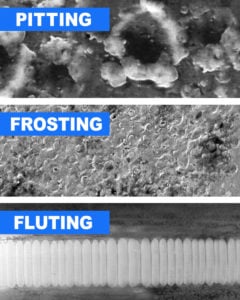In the quest for energy efficiency, more and more engineers are specifying variable frequency drives (VFDs) to control ac motors. According to one large construction database, VFDs were specified in 44% of new construction projects calling for motors in 2018. These drives save large amounts of energy in variable torque applications by running motors at less than full speed. They also enable precise control of motor speed. These are the drives' two big pros.
But they also have their cons. Unlike mains power, their ac output is not sinusoidal, but pulse width modulated: Each phase comprises a series of dc pulses with fast rise times. Because they are pulsed, the phases are not balanced. That is, the sum of the three phases' voltage, the common mode voltage, is not always zero. The high dV/dt of the pulses can damage the stator windings, and the nonzero common mode voltage causes a shaft voltage that discharges through and damages the bearings. (For more detail, see this IEEE paper.)
The bottom line: VFDs' output can cause motor failure, requiring costly repair or replacement, and potentially even more costly downtime. Imagine a data center with hundreds of VFD-fed HVAC motors failing one after another. And the specifier may be held liable for these losses.
The CSI 2300 Master Spec says (Subsection 1.7, A) that drives shall not impose conditions that can reduce motor life... and NEMA Standard MG1 requires the use of "definite purpose inverter-duty related motors" for use with VFDs. So how can you ensure that you specify adequately protected motors?
The windings can be protected with enhanced insulation, with a higher corona inception voltage. Inverter-ready and inverter-duty motors have Class F or H winding insulation. All NEMA Premium® motors include such robust insulation.
As for the bearings: CSI requires "a shaft ground kit." Shaft grounding provides a low-resistance discharge path, so shaft voltage dissipates harmlessly through the grounding device instead of discharging through the bearings. The longest-lived and lowest-maintenance shaft grounding device currently available is the AEGIS® Shaft Grounding Ring. AEGIS is also the only shaft grounding product that offers a warranty against electrical bearing damage.
AEGIS rings can be installed on new or in-service motors. But for both specifiers and installers, it is easiest to get a new motor with the ring already installed. Luckily, several of the largest motor manufacturers offer product lines with AEGIS rings factory-installed on stock motors. These include ABB (Baldor), Marathon, WEG, LEESON, US Motors, and TECO-Westinghouse. More information on makes and models is available here and at Industrial Matrix.
For resources on how to specify motors with AEGIS, please see this whitepaper. You might also be interested in the recommended AEGIS specification language or this CSI Division 23 05 13 with AEGIS called out.
AEGIS Rings also come with a 2-year extended warranty against bearing fluting damage. No other form of protection against VFD-caused bearing damage offers a warranty like this.

To learn more about AEGIS shaft grounding and best practices for electrical bearing protection, sign up for a training. We offer monthly live training webinars, and - pandemic restrictions permitting - we can also visit your facility to review your exact application.



